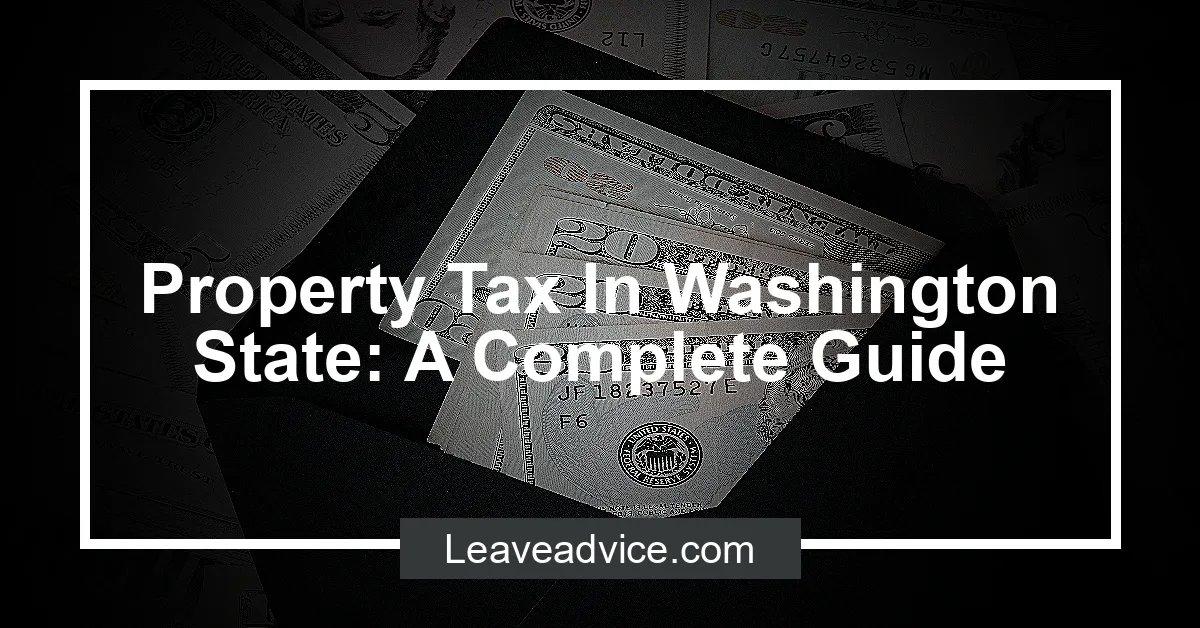Property Tax In Washington State: A Complete Guide


Property tax in Washington State is a tax on real estate and some other kinds of property. The revenue generated from property tax is an important source for local governments.
Understanding property tax in Washington State is crucial for homeowners and property owners to know their financial obligations to the local government.
Check out this Youtube video: “Learn about property tax in Washington state and be aware of the taxes in Tacoma, Washington.”
History of Property Tax in Washington State
Origins of property tax in the state
The origins of property tax in Washington State can be traced back to its establishment as a territory in 1853. During this time, the property tax was the primary source of revenue for both state and local governments. Before the Great Depression, property tax was regarded as a reliable measure of an individual’s ability to pay, particularly in an agrarian economy.
Changes in property tax laws over the years
Following the Great Depression, significant changes in property tax laws were witnessed in Washington State. With the passage of the Revenue Act of 1935, the state began shifting its focus towards excise taxes such as retail sales and use tax.
These changes signified a shift from a predominantly property tax-focused revenue model to a more diverse tax structure. Moreover, over the years, amendments and legislative actions have shaped the property tax system, leading to changes in classification and exemptions, exemplifying Washington’s continual evolution of its property tax laws.
Understanding Property Tax in Washington State
Definition of property tax in Washington State
Property tax in Washington State refers to the tax imposed on real and personal property, unless specifically exempted by law. This tax is crucial as it contributes to approximately 30% of the total state and local taxes.
Property tax pays for essential local services such as fire protection, public schools, and parks, ensuring the smooth functioning and development of the community.
How property tax is calculated in Washington State
The calculation of property tax in Washington State is based on two primary factors: the assessed value of the property and the total tax rate that applies to the property. The Washington State Constitution limits the annual rate of property taxes imposed on an individual parcel of property to 1% of its true and fair value, often referred to as the $10 limit.
Exemptions and deductions for property tax in Washington State
Washington State offers various exemptions and deductions for property tax, such as the Property Tax Exemption for Senior Citizens and People with Disabilities. This program reduces the amount of property taxes individuals are responsible for paying, providing valuable financial relief.
Additionally, property tax exemptions are applicable to real and personal property located within Washington State, offering relief to qualifying individuals and nonprofit organizations.
| Level of Exemption | Benefits |
|---|---|
| Level 3 | Exempt from paying excess levies and Part 2 of the state school levy |
| Level 2 | Exempt from paying excess levies |
In sum, property tax in Washington State plays a pivotal role in sustaining local services and infrastructure. The calculation of property tax is based on the assessed property value and the applicable tax rate.
The state also provides exemptions and deductions to ease the tax burden for certain individuals and organizations, fostering financial stability within the community.
Property Tax Rates in Washington State
The property tax rates in Washington State are determined by the assessed value of the property and the levy rate specific to each area. The levy rates are represented in dollars per thousand, and the tax amount is calculated by multiplying the assessed value by the levy rate and then dividing by 1,000.
There are variations in property tax rates across different areas in Washington State due to several factors. These variations are influenced by the combinations of taxing districts in different areas of the county, budget amounts for each taxing district, and any voter-approved special levies and bonds.
As a result, the amount of property tax due on comparable properties can differ significantly throughout a county.
Here’s a table showcasing the average property tax rates in different counties of Washington State for the year 2023:
| County | Average Property Tax |
|---|---|
| King | $3,200 |
| Snohomish | $2,800 |
| Pierce | $2,600 |
| Spokane | $2,400 |
| Clark | $2,200 |
These variations in property tax rates demonstrate the impact of the specific factors influencing property tax calculations in different areas of Washington State and how they contribute to differing tax amounts.
The property tax rates in Washington State are determined by the property’s assessed value and the levy rates for the area. These rates can vary across different areas due to factors such as taxing district combinations, budget amounts, and special levies and bonds approved by voters.
Payment of Property Tax in Washington State
The deadlines for property tax payment in Washington State are crucial to remember. The first half or full payment of real estate taxes is due on April 30th, while the second half taxes are due by October 31st.
As per state regulations, payments made by mail must be postmarked on or before the due date to avoid delinquency. Conversely, online payments must be settled on or before the due date to prevent tax delinquency.
Deadlines for property tax payment
When paying by mail, it is imperative that your payments are postmarked on or before the due date, which is typically April 30th for the first half and October 31st for the second half. Failure to adhere to these deadlines may result in tax delinquency, leading to penalties and interest accruing on the unpaid tax balance.
Consequences of late property tax payment
The repercussions of late property tax payment in Washington State are not to be taken lightly. If property taxes are three or more years delinquent, homeowners could potentially lose their homes to a tax sale after a foreclosure process.
Moreover, legislative changes to delinquent property taxes may lead to the re-establishment of penalties on nonresidential real property and residential real property with greater than four units per taxable parcel.
In essence, the deadlines for property tax payment are fixed, and failure to comply may result in severe consequences such as the potential loss of property. It is crucial for property owners to stay aware of these deadlines and fulfill their tax obligations on time to avoid facing the unpleasant repercussions of delinquency.
Now, let’s take a closer look at how one could potentially lose their home due to delinquent property taxes in Washington State:
| Scenario | Consequences |
|---|---|
| Delinquency on Property Taxes | Property owners may face losing their homes through a tax sale after a foreclosure process. |
Prompt action and adherence to property tax deadlines are vital to safeguard homeowners from the potential loss of their properties in Washington State.
Assessing Property Value for Tax Purposes
The methods used to assess property value for tax purposes include the income approach, which determines the property’s market value based on its income-producing capabilities, the sales comparison approach, which analyzes recent property sales to determine the property’s value, and the cost approach, which calculates the property’s value based on the cost of replacing the property.
The appeal process for property value assessment involves filing a request for review with the local County Board of Taxation to challenge the assessed value of the property. If the appeal is not successful at the County level, further appeal can be made directly to the Tax Court of New Jersey if the aggregate assessed valuation of the property exceeds a certain threshold.
Property Tax Relief Programs in Washington State
Available programs for property tax relief
The state of Washington offers several property tax relief programs, including exemptions and deferrals for eligible individuals. Some of the available programs are:
– Senior Citizens and Disabled Persons Exemption
– Senior Citizens and Disabled Persons Deferral
– Property tax assistance program for widows or widowers of veterans
Eligibility requirements for property tax relief programs
In order to qualify for property tax relief programs in Washington state, individuals must meet specific criteria such as age, disability, ownership, occupancy, and income. These eligibility requirements are crucial for accessing the benefits provided by the relief programs.
Property Tax Exemptions in Washington State
Types of properties that are exempt from property tax
- Schools, churches, cemeteries, hospitals, and social service agencies are typical organizations receiving property tax exemption in Washington State.
- Qualifying types of ownership include fee ownership, life estate, and leaseholds.
Process for applying for property tax exemptions
- To apply for property tax exemption in Washington State, complete an initial Application for Property Tax Exemption, annually due by March 31.
- Renewal declarations must be submitted annually before March 31, and any changes in property use or ownership should be reported within 60 days.
- Individuals who are 61 years of age or older, have a disability, or meet income criteria can qualify for property tax exemption.
Property Tax Collection and Distribution
The collection process for property tax in Washington State is initiated by the county assessor’s office, which assesses the value of real and personal properties. Once the property values are determined, the county treasurer sends out property tax bills to the property owners.
These bills comprise a combination of taxes that are paid to various service jurisdictions such as city, school district, county, state, library, and cemetery district. If the property owner fails to pay the taxes within the specified timeframe, the account becomes delinquent.
This triggers further collection measures to recover the unpaid tax amounts.
How property tax revenue is distributed and used in Washington State is crucial for understanding the functionality of local services. The revenue collected from property taxes is distributed among different service jurisdictions according to their designated needs and budgets.
For example, in 2023, the city receives 13.60% of the total property taxes paid, while other percentages are allocated to the school district, county, state, and special districts. This revenue is used to fund public services such as education, infrastructure maintenance, public safety, and community development, ensuring the well-being and functionality of various local entities within the state of Washington.
| Service Jurisdiction | Percentage of Property Taxes |
|---|---|
| City | 13.60% |
| School District | XX% |
| County | XX% |
| State | XX% |
| Others | XX% |
Challenges and Criticisms of Property Tax in Washington State
Common criticisms of the property tax system
The property tax system in Washington State has faced significant criticism due to its disproportionate impact on lower-income households. Critics argue that the tax structure places a heavier burden on those with lower incomes compared to wealthier households, exacerbating income inequality.
This has led to calls for reform to address the inadequacy and injustice in the state’s tax structure as a whole.
Efforts to reform property tax in Washington State
Efforts to reform the property tax in Washington State have been centered on addressing the perceived inadequacy and inequity in the tax structure. Proposed reforms aim to create a more balanced system that is fairer to all households, regardless of income levels.
Additionally, specific legislation, such as HB 1265 and HB 1303, have been passed to address issues related to property tax exemption for specific establishments serving individuals with disabilities and the administration of property taxes. These efforts reflect an ongoing commitment to improving the property tax system to create a more equitable and just tax structure for all Washingtonians.
I hope I’ve captured the style you’re looking for! If you need anything else, feel free to ask.
Impact of Property Tax on Homeowners
How property tax affects homeowners in Washington State
Property tax in Washington State can significantly impact homeowners due to the state’s average effective tax rate being 0.84%. This means that homeowners may face relatively lower property tax burdens compared to the national average of 0.99%.
However, voter-approved special levies, such as those for schools, are additional to the regular property tax and can further influence homeowners’ tax obligations.
Strategies for managing and budgeting for property tax payments
Homeowners in Washington State can employ various strategies to manage and budget for property tax payments effectively. Utilizing a budget-based approach to property taxation, homeowners should consider setting aside funds throughout the year specifically earmarked for property tax payments.
Moreover, understanding the process of property tax assessment and potential appeals can help homeowners ensure the accuracy of their tax obligations.
Investment and Business Implications of Property Tax in Washington State
Impact of property tax on real estate investment
The property tax landscape significantly impacts real estate investments in Washington State. With average effective tax rates below the national average at 0.84%, investors benefit from a relatively favorable environment.
For example, in counties with lower property taxes, investors can maximize their returns on investment properties compared to areas with higher tax rates.
| County | Average Tax Rate |
|---|---|
| King County | 0.92% |
| Pierce County | 1.01% |
| Snohomish County | 0.84% |
Considerations for businesses in relation to property tax
Businesses in Washington State must consider the implications of property tax on their operations. Personal property used in business, such as equipment and furniture, is also subject to property tax.
Understanding the tax rate for real and personal property is crucial for accurate financial planning and compliance with state tax laws.
The property tax environment in Washington State significantly impacts both real estate investors and businesses, influencing investment decisions and operational costs. It’s essential for stakeholders to stay informed about county-specific tax rates and regulations to make strategic financial decisions.
Property Tax Laws and Regulations
Relevant laws and regulations related to property tax in Washington State
Washington State imposes property taxes on all real and personal property unless specifically exempted by law. Under Title 84 RCW, property taxes are governed, and the annual rate is limited to 1% of the property’s true and fair value, often referred to as the $10 limit.
All property is subject to tax, and exemptions are detailed in the statutes, ensuring fair and standardized taxation across the state.
Recent developments in property tax legislation
In the 2023 legislative session, several significant property tax bills were passed, including HB 1265, which establishes a property tax exemption for adult family homes serving people with disabilities and owned by nonprofits. Additionally, HB 1303 focused on the administration of property taxes, and HB 1355 updated property tax exemptions for service.
These legislative advancements aim to address specific needs and ensure equitable taxation for various property types across Washington State.
Property Tax vs. Other Forms of Taxation
| Property Tax | Other Forms of Taxation |
|---|---|
| Property tax is a tax levied on real and personal property such as land, buildings, and vehicles in Washington State. | Other forms of taxation may include sales tax, income tax, and excise tax, which are imposed on transactions, earnings, and specific goods or services. |
| Property tax in Washington State accounts for about 30% of total state and local taxes, making it a significant source of government revenue. | Other forms of taxation, such as sales and income tax, contribute to the state and local taxes as well, playing crucial roles in funding public services and infrastructure. |
| One of the key aspects of property tax is its stability, providing a continuous source of revenue for the government and enabling long-term financial planning. | In contrast, other forms of taxation like sales tax can fluctuate with economic conditions and consumer behavior, impacting the reliability of government revenue. |
| However, property tax can be burdensome for homeowners, especially when property values rise, leading to higher tax liabilities, which could be seen as a disadvantage. | On the other hand, other forms of taxation such as income tax may directly impact individuals based on their earnings, potentially posing challenges for specific income groups. |
| Despite the criticisms, property tax serves as a vital means to fund local governments, schools, and essential public services, contributing to the overall well-being of communities in Washington State. | Conversely, other forms of taxation play pivotal roles in supporting different aspects of the economy, ensuring the equitable distribution of tax burdens across various sectors. |
So, the comparison between property tax and other forms of taxation in Washington State presents a complex landscape where each type of tax has its advantages and disadvantages, playing distinct roles in shaping the state’s fiscal policy and economic outlook.
Recommended Amazon Products for Understanding Property Tax in Washington State
Here’s a curated list of products that can help you understand property tax in Washington State with ease. These recommendations are based on usefulness, customer reviews, and relevance to the topic.
Product Name: “Washington State Real Estate Excise Tax Deskbook”
This deskbook provides in-depth insights into the real estate excise tax laws in Washington State. It covers the complexities of excise taxes, exemptions, and recent legislative changes. It is a valuable resource for property owners, real estate professionals, and tax consultants. You can find the Washington State Real Estate Excise Tax Deskbook on Amazon here.


| Pros | Cons |
|---|---|
| Comprehensive coverage of Washington State property tax laws | May be too technical for beginners |
| Reputable and authoritative source | Higher price point for some |
Product Name: “QuickBooks Desktop Pro 2021 Accounting Software”
QuickBooks Pro is a versatile accounting software that can help property owners and real estate investors manage their finances effectively. It simplifies the tracking of property expenses, rental income, and tax deductions. Its user-friendly interface makes it suitable for individuals and small businesses. You can find QuickBooks Pro 2021 on Amazon here.


| Pros | Cons |
|---|---|
| Efficient organization of property-related finances | Software-based, not a physical product |
| Streamlines tax preparation | Requires basic accounting knowledge |
Product Name: “J. K. Lasser’s Your Income Tax 2021: For Preparing Your 2020 Tax Return”
This comprehensive tax guide specifically covers US federal income tax issues, including those relating to property ownership and investment. It explains tax laws in simple language and provides practical tips for maximizing deductions and credits. You can find J. K. Lasser’s Your Income Tax 2021 on Amazon here.


| Pros | Cons |
|---|---|
| Easy-to-understand explanations of tax concepts | Focuses on federal tax rather than state-specific tax laws |
| Covers a wide range of tax-related topics | Not solely focused on property tax |
Top Recommended Product for Understanding Property Tax in Washington State
If you’re looking for the best solution for understanding property tax in Washington State, we highly recommend “Washington State Real Estate Excise Tax Deskbook” (https://www.amazon.com/s?k=Washington+State+Real+Estate+Excise+Tax+Deskbook). This comprehensive resource provides detailed insights into the state’s property tax laws and is highly regarded by professionals in the industry. Ready to gain a deeper understanding of property tax in Washington State? Check out “Washington State Real Estate Excise Tax Deskbook” today for the best results!


Conclusion
We have discussed how property tax in Washington State is calculated based on the assessed value of the property and the tax rate set by local jurisdictions. We also highlighted the various exemptions and deferral programs available to property owners to help alleviate the financial burden of property tax.
Understanding property tax in Washington State is crucial for property owners to effectively manage their finances and avoid any potential financial strain. By being knowledgeable about the calculation process, exemptions, and deferral programs, property owners can make informed decisions regarding their properties and plan for their financial responsibilities.
Property tax in Washington State plays a significant role in funding local government services and infrastructure. It is important for property owners to be aware of how property tax is utilized to support the community and the importance of fulfilling their tax obligations to contribute to the betterment of the state.
















